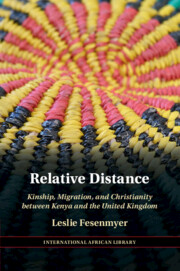Book contents
- Relative Distance
- The International African Library
- Relative Distance
- Copyright page
- Contents
- Acknowledgements
- List of Characters
- Introduction
- 1 Securing the Future: Family, Livelihoods, and Mobility
- 2 Aspirations, Obligations, and Imagination in Family Migration
- 3 The Making of ‘Migrants’
- 4 Kinship Dilemmas: Negotiating Relatedness across Space
- 5 Weddings as Transnational Household Rituals: Marriage and Other Intimate Relationships
- 6 Change and Continuity: The Social Reproduction of Families between Kenya and the United Kingdom
- Conclusion
- References
- Index
- Series page
2 - Aspirations, Obligations, and Imagination in Family Migration
Published online by Cambridge University Press: 22 June 2023
- Relative Distance
- The International African Library
- Relative Distance
- Copyright page
- Contents
- Acknowledgements
- List of Characters
- Introduction
- 1 Securing the Future: Family, Livelihoods, and Mobility
- 2 Aspirations, Obligations, and Imagination in Family Migration
- 3 The Making of ‘Migrants’
- 4 Kinship Dilemmas: Negotiating Relatedness across Space
- 5 Weddings as Transnational Household Rituals: Marriage and Other Intimate Relationships
- 6 Change and Continuity: The Social Reproduction of Families between Kenya and the United Kingdom
- Conclusion
- References
- Index
- Series page
Summary
Chapter 2 focuses on the migration stories of two generations of Kenyans, situating them within wider family and social histories. Although only one person in a family typically moved, I argue that their migration is better understood as family migration, rather than economic migration. While economic gain and social possibilities are related, they are not the same. Rather, these migration projects marked the convergence of individual and familial aspirations, thereby re-centring kinship as a means of realising the futures of both those who moved and those who stayed. The imaginings of migrant and non-migrant kin are important to this discussion and reveal how the United Kingdom was a largely imagined place at the time of migration, though not an arbitrary migration destination. Alongside this focus on place and space, the chapter begins to explore the role of time and temporality in the self- and life-making projects of migrants and their families.
- Type
- Chapter
- Information
- Relative DistanceKinship, Migration, and Christianity between Kenya and the United Kingdom, pp. 55 - 78Publisher: Cambridge University PressPrint publication year: 2023

